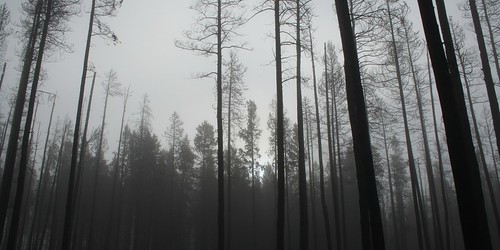
{Photo by Secret Agent Martens.}
I know I rashly wrote yesterday that I was wrapping up my series of posts on ghosts and spirits, but it turns out that just like Jason Voorhees, I'm not quite finished yet. Hallowe'en's still a ways away; who knows how many times I'll lurch back into view with more scares?
From Moby-Dick (1851), by Herman Melville
Though in many of its aspects this visible world seems formed in love, the invisible spheres were formed in fright.Note how Melville moves from the potential, the seeming, to the definite: what we can see we cannot know, but what we cannot see we know deep in our bones. Good tellers of ghost stories have always known that; as Michel Tournier explains in The Mirror of Ideas (1994),
There is such a thing as an atavistic fear, digging its roots down to an ancestral past sleeping in our hearts; eternal humanity trembles with us in the presence of mystery. . . . It is the darkness itself that frightens--not the monsters hiding in it.The merest hints of horror catch in the soul; the less a storyteller describes, the less he provides for our rational minds to attack and reject. As M. R. James wrote in "Ghosts--Treat Them Gently,"
On the whole, then, I say you must have horror and also malevolence. Not less necessary, however, is reticence.
Limn lightly the horror--give us, as Peter Ackroyd puts it,
the sudden stillness in a wood, or the sound of footsteps in an empty street--and we will supply the rest. Even Stephen King, not someone usually associated with reticence, demonstrates that he knows the power of the undescribed when he uses it to create the most chilling moment in 'Salem's Lot. At midnight, a man at the gate of a graveyard raises his voice in prayer to his dark lord, then:
There was no sound but that brought on the breeze. The figure stood silent and thoughtful for a time. Then it stooped and stood with the figure of a child in his arms.By claiming to have come up against the limits of what language will even tolerate, King frees our imaginations to run on the darkest of paths, which of course they will do. For despite what we tell ourselves when encouraged by daylight, as the night steals in we remember that fear is built into the very structure of the universe. All that awaits us is the greater unknown of death. And while we feverishly distract ourselves from its approach, death for its part can afford to be patient.
"I bring you this."
It became unspeakable.
From The Zurau Aphorisms (2004), by Franz Kafka, translated by Michael Hoffman
The dogs are still playing in the yard, but the quarry will not escape them, never mind how fast it is running through the forest already.Is it any wonder that we take pleasure, however perverse, in telling ghost stories?
No comments:
Post a Comment